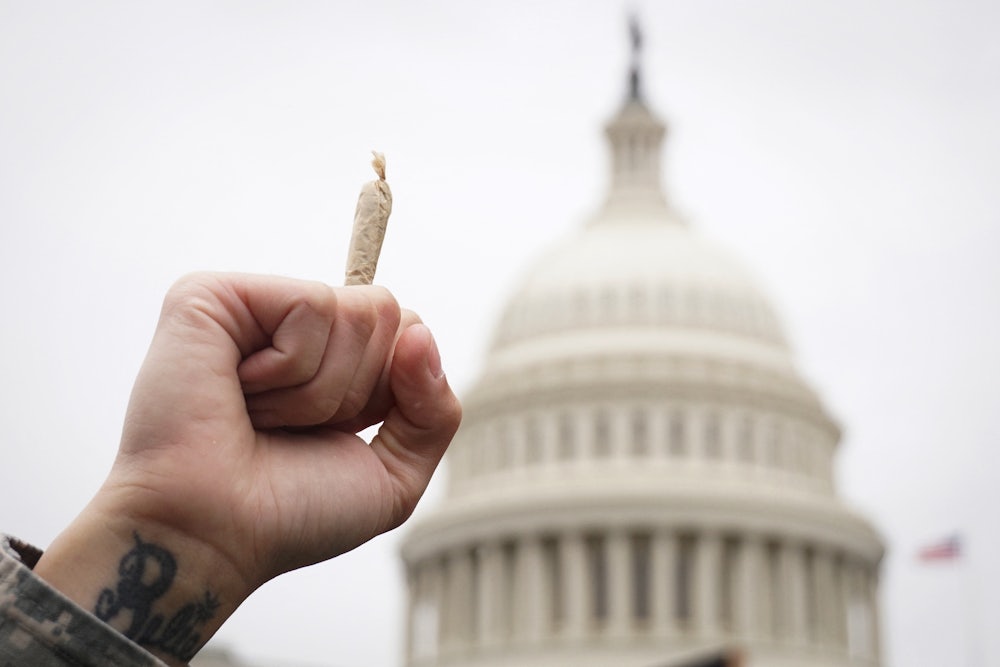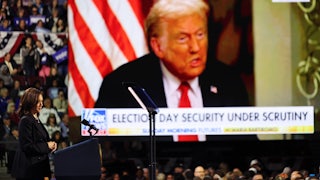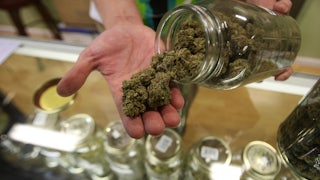“Dank Brandon” isn’t the legacy Joe Biden wanted, but too bad: No president has done more for legal weed in America. With popular bipartisan cannabis reform bills hopelessly stalled in a historically ineffectual Congress, President Biden came to the rescue. In October 2022, he issued an executive order that declared federal marijuana law a “failed approach” and ordered Cabinet-level agencies to review it—with the clear message that it was long past time to change the federal government’s approach to the drug.
For fifty years, the federal government had classified marijuana as more dangerous than opium and fentanyl, the deadly opioid driving the drug overdose crisis. Not anymore: Biden’s directive led to a recommendation from health regulators that cannabis be reclassified as a Schedule 3 drug, down from Schedule 1. And this spring, the Justice Department—including the Drug Enforcement Administration—acquiesced, marking the first loosening of federal restrictions on marijuana since Richard Nixon signed the Controlled Substances Act in 1970. Taken together, Biden’s actions represent what most constitutional scholars agree is the most a president can do—and he did it just in time. Shortly after the teetotaling Biden acted, Democrats outperformed expectations in the 2022 midterms.
For most of the past decade, conventional wisdom has held that weed is good for Democrats and bad for Republicans. It’s reductive, but some credit Arizona’s 2020 legalization measure and boosted youth turnout for Biden flipping the state blue. Pretty much everybody likes weed these days, or at least is sick of the drug war: Polls show cannabis reform is wildly popular with young voters and independents, but even a majority of self-identifying conservatives and Republicans now favor legalization. But that doesn’t mean it’s a winning issue—for either party.
Look no further than Kamala Harris’s announcement on October 15 that she wants to make safe and legal cannabis “the law of the land.” Full legalization is a major step forward for Democrats, but, buried in a five-point plan pitched at wooing skeptical Black voters, it received little coverage: Support for legalization barely registers as news anymore.
That’s partly because Harris was too late. If Democrats wanted to use weed reform as a 2024 campaign issue, be it to win over progressives horrified with the carnage in Gaza and Lebanon or to win back Black men under 50 defecting to Trump, or just to give the crypto-libertarians something to be excited about, they appear to have missed their moment.
This election, voters in three states—all of them red, the most notable of which is Florida—will vote to legalize marijuana. It is possible—though highly unlikely—that cannabis could help Harris win and turn the Sunshine State blue for the first time since 2012. In other swing states, including too-close-to-predict Pennsylvania, legalization is bottled up in Republican-dominated legislatures. That’s something a presidential candidate could call out to rally or even expand the base. But Democrats weren’t the first to capitalize on this year’s ballot measures or build on Biden’s generational progress in 2024. Donald Trump was.
In early September, Trump pushed marijuana reform into the 2024 campaign when he became the first major-party presidential nominee to endorse a marijuana legalization measure.
“As a Floridian, I will be voting YES on Amendment 3 this November,” Trump posted on Truth Social late on September 8, referring to the constitutional amendment that would legalize cannabis for adults 21 and up in his new home state.
He went on to endorse bipartisan (but Democratic-led) marijuana banking reform and medical marijuana research as well as the Biden-initiated process to reclassify cannabis as a Schedule 3 drug. That soothed fears that Trump might roll rescheduling back, which scored the ex-president some more points among the pro-weed set. In contrast, Harris didn’t mention rescheduling—by any measure a big win for her administration—for another six weeks, when she finally brought it up during an October 15 interview with Breakfast Club host Charlemagne Tha God.
Trump’s pro-weed turn is less radical than it might appear. For one thing it broadly reflects where public opinion has been for years. For another, all he really did was endorse the Biden administration’s existing cannabis policy. What is more interesting, however, was the immediate Democratic response: nothing.
Harris had not mentioned marijuana at all since becoming the nominee in mid-July until a September 30 appearance on former NBA stars Matt Barnes and Stephen Jackson’s podcast All the Smoke, when she made only an anodyne reference to decriminalization, saying she “strongly” believed that people “should not be going to jail for smoking weed.” Before the release of an October 14 campaign memo aimed at pushing legal marijuana as a path to Black male wealth generation, neither she nor any other leading Democrat did anything to update the party platform’s tepid position on cannabis, which doesn’t mention legalization at all. Even that seemed to treat cannabis as an afterthought, lacking in specifics or even any fresh ideas.
The silence and inaction was baffling and troubling for pro-weed Democrats, who worry Trump could still steal the issue despite his thin record.
“There’s absolutely no downside” for Harris to play up cannabis reform, said U.S. Representative Earl Blumenauer, the retiring Oregon Democrat who supported marijuana bills in Congress decades ago, when it was a fringe issue for weirdos like Ron Paul and himself. Blumenauer believes that legalization helped Biden find the 30,000 votes that won Arizona, and thinks John Fetterman’s strident pro-weed advocacy as Pennsylvania lieutenant governor (his wife is a cannabis patient) helped him decisively beat Mehmet Oz.
“I have emphasized that repeatedly to people in the administration,” Blumenauer said, declaring cannabis “overwhelmingly positive for people who are willing to embrace the right side of the issue.”
Trump’s pro-weed supporters attempted to turn his support for legalization and Harris’s prior silence into a wedge issue. But Trump did nothing but post an endorsement, and that required little strategic thinking beyond reading the polls.
And he is quite late to the party—and doesn’t have any record to stand on. As president, Trump took an approach to reform that is best described as benign neglect.
His first attorney general was Jeff Sessions, a drug-war apologist who revoked friendly Obama-era Justice Department guidance that discouraged federal prosecutors from targeting state-legal weed operations. Sessions made little secret of his hatred of the drug during his brief tenure, referring to marijuana as “only slightly less awful” than heroin in March 2017. His old-school approach spooked the legal cannabis industry and raised fears of a renewed crackdown, but nothing came of it as Sessions quickly fell out of favor after recusing himself from the Department of Justice’s probe into Russian interference in the 2016 election. His successor, former Geoge H.W. Bush Attorney General Bill Barr, didn’t touch cannabis at all as several states moved to legalize it. (Barr is now in the employ of Smart Approaches to Marijuana, probably the country’s most prominent anti-legalization outfit.) On the last morning of his presidency, Trump did pardon 12 nonviolent marijuana offenders before leaving the White House in a huff. By contrast, Biden has pardoned thousands over the past four years.
Harris’s track record is considerably stronger, though it’s also mixed and arguably thin—not particularly surprising given her long career as a prosecutor. During her stint as San Francisco’s district attorney, Harris prosecuted marijuana crimes, albeit less aggressively than many of her counterparts: Between 2003 and 2010 she oversaw a total of 1,900 marijuana convictions, a very modest number by national standards. (In New York City, police arrested 52,000 people for marijuana possession in 2011 alone; Harris’s prosecutions involved sales or other more serious violent charges.) And on her watch, both the District Attorney’s office and San Francisco Police Department obeyed a 2006 law that made marijuana possession the “lowest priority” for law enforcement. As the “top cop” in San Francisco and later California, Harris allowed legal commercial medical marijuana sales to flourish across the state, winning her the support of many dispensary owners.
Democrats like Blumenauer are quick to point out Harris’s stronger record as senator, when she sponsored ambitious federal legislation to legalize cannabis nationwide—and to do so with strong social equity provisions that would guarantee at least some of the economic benefits to minorities and women.
But the Harris-sponsored Marijuana Opportunity Reinvestment and Expungement Act went nowhere, as has every pro-weed bill under Democratic Majority Leader Chuck Schumer (though a banking reform bill did at least get a “historic” committee hearing before it too was lost in limbo). That’s less an indictment of the Democratic Party than it is a reflection of how cloture rules and the filibuster conspire to make it impossible to do anything remotely controversial in Congress. Still, Democrats’ tendency to champion the issue and then deliver bupkis has been a long-standing source of frustration.
“There’s been a lot of lip service paid to cannabis, but there hasn’t been nearly enough action following the words,” said Emily Paxhia, a California-based investor and co-founder of Poseidon Asset Management, one of the first marijuana-focused private equity funds. “Honestly, it’s like every time things get talked about and aren’t put forward or don’t get passed, it’s like the wound gets deeper in terms of the downside to the industry.”
Harris’s reluctance to stake out a bolder position on the presidential campaign trail has been conspicuous, especially as she strives to portray herself as someone willing to work with Republicans. Even in one of the most divided congresses in history, there is growing bipartisan accord on weed. After Blumenauer, Congress’s most outspoken legalization supporters include lightning-rod Republicans like U.S. Representatives Matt Gaetz of Florida and Nancy Mace of South Carolina.
Trump’s embrace of weed is best explained not as a policy shift but as a part of a larger strategy to win “the bro vote”: Joe Rogan listeners, mixed martial arts fans, Barstool Sports followers—many of these people also like weed. Trump has certainly gained a foothold with this audience, but it does have a drawback: Young men are low-propensity voters. At the same time, most Republicans, including Trump’s running mate, JD Vance, and his former heir apparent Florida Governor Ron DeSantis are opposed to full legalization.
It does seem a stretch to say cannabis will be a decisive wedge issue when abortion protections are also on the ballot in Florida—and Nebraska, where a medical marijuana legalization measure also appears to have qualified—but close elections have hinged on less.
And talk is free. While quantifying the boost Harris would enjoy with a stronger position on cannabis reform is difficult, her lukewarm embrace of the issue is baffling: The Biden administration’s accomplishments are popular, tangible, and seismic. There’s no downside to highlighting it from time to time, or staking out even more ambitious territory.
“I don’t think Donald Trump has gained an advantage—I think it’s more he neutralized a potential advantage of Kamala Harris’s she was already choosing to forgo,” said Matthew Schweich, the executive director of the Marijuana Policy Project.
It’s not inconceivable that, given the shift in public opinion, the mainstream GOP position will look a lot like the current Democratic one in a few election cycles—a shift that may be happening more quickly than it would have thanks to Harris’s inaction and silence on marijuana.
“There’s no good reason at all that our Democratic candidate for president should be holding the same position as Republican opponents,” Schweich said. But, as Election Day nears, that’s the position that Democrats are in.
Of course, nothing vindicates any policy choice—even a weak one—like winning. Back in 2010, Harris defeated Los Angeles District Attorney Steve Cooley, one of the only Republicans she’s ever had to run against, by a razor-thin margin. The state’s cannabis advocates, who went to the polls in large numbers that November to back an early (and failed) legalization measure, later claimed credit.
If Harris racks up wins across the marijuana-friendly Upper Midwest, campaigners will say legalization played a role. But if what seems certain to be a tight election comes down to a few thousand votes in a contested county in Pennsylvania or North Carolina, be prepared to listen to four years of cannabis advocates claiming weed would have made the difference. The thing is, they might be right.




